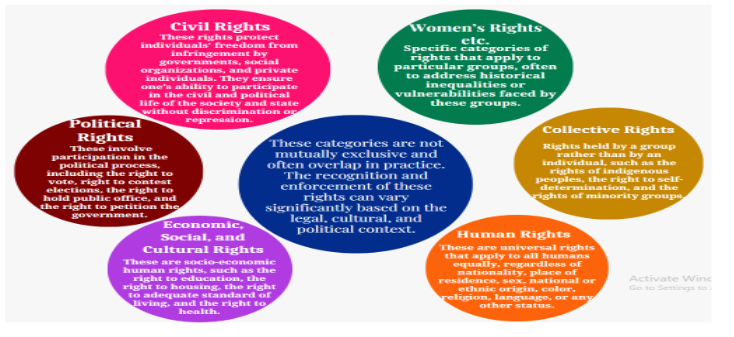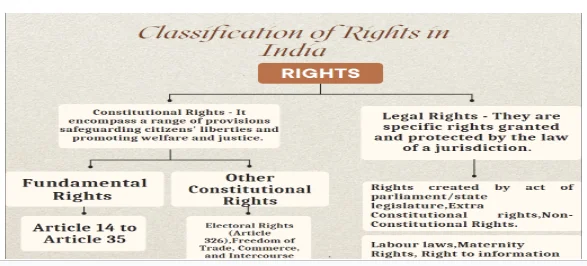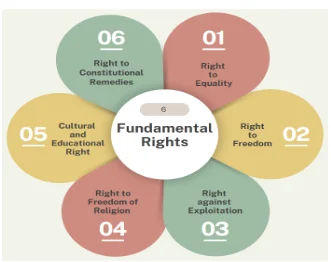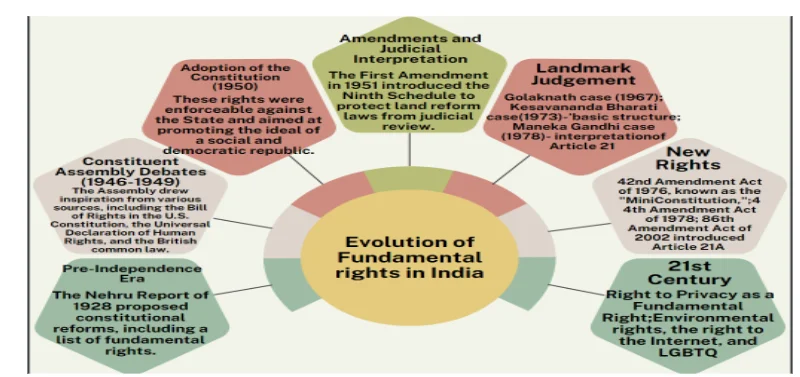Rights are fundamental entitlements recognized by legal systems, social norms, or ethical principles to protect individual freedoms and interests. They serve as a foundation for democratic systems, balancing individual liberties with societal welfare. In India, Fundamental Rights enshrined in the Constitution ensure justice, equality, and dignity for all, forming the bedrock of the nation’s democratic framework.
Understanding Rights and Fundamental Rights in the Indian Constitution
Understanding the Concept and Nature of Rights
- Definition of Rights: Rights are defined as entitlements or permissions recognized by legal systems, social norms, or ethical principles.
- These rights safeguard individual freedoms and interests, enabling action or inaction as per one’s judgment.
- Categories of Rights: Rights encompass various categories like civil, political, economic, social, and cultural, addressing diverse aspects of human and social life.
- Fundamental to democratic systems, they balance individual liberties with broader societal welfare.
- Nature of Rights: Rights are not absolute in character.
- The welfare of the individuals as members of a society lies in a compromise between their rights as individuals and the interests of the society to which they belong.
- Relationship Between State and Individual: Rights establish the relationship between the State and the individual.
- The concept of individual rights emerged in modern times, starting in Europe during the 15th and 16th centuries.
- Rights are protections against state absolutism.
- It comes from the idea that people are inherently provided with certain unalienable rights by their creator reflecting the intrinsic nature of rights.
- To quote Scholar Hobhouse, “Rights are what we may expect from others and others from us, and all genuine rights are conditions of social welfare. Thus, the rights anyone may claim are partly those that are necessary for the fulfillment of the function that society expects from him. They are conditioned by, correlative to, his social responsibilities.”
Enroll now for UPSC Online Course
Relationship Between Rights and Claims
Rights are indeed claims, but every claim is not a right. A claim is not a right if it is not recognised; it is not a right if it is not enforced.
- Recognition of Claims: Claims which are not recognised are empty claims; claims not enforced are powerless claims.
- Transformation into Rights: Claims become rights when they are recognised by society.
Difference Between Rights and Privileges
| Aspect | Description |
| Rights vs. Privileges |
|
| Universality of Rights |
|
| Non-discriminatory Nature of Rights |
|
| Evolution of Rights |
|
Theory of Natural Rights
-
- Advocates of Natural Rights Theory: The theory of natural rights has been advocated mainly by Thomas Hobbes, John Locke and J.J. Rousseau.
- These scholars provided the social contract theory and held the view that there were natural rights possessed by men in the state of nature (where no state existed) and that these rights were attributed to individuals as if they were the essential properties of men as men.
- They declared that the rights are inalienable and indefeasible.
- Criticism of Natural Rights Theory: The theory of natural rights is criticized on many grounds.
- Rights cannot be natural simply because they were the possessions of men in the state of nature.
- Rights presuppose the existence of some authority to protect them.
- Advocates of Natural Rights Theory: The theory of natural rights has been advocated mainly by Thomas Hobbes, John Locke and J.J. Rousseau.
- About Social Contract:
-
- Definition of Social Contract: A social contract is a theoretical concept that refers to an implicit agreement among individuals in a society.
- Hypothetical Agreement: In this hypothetical agreement, people agree to abide by certain rules and norms in exchange for the protection of their rights and the benefits of a structured society.
- Willingness to Give Up Freedoms: The idea is that individuals are willingly to give up some personal freedoms to live in a society with shared rules and protections.
- Legitimacy of Governmental Authority: The social contract forms the basis for the legitimacy of governmental authority and the establishment of a just and orderly society.
Types of Rights

Fundamental Rights in the Indian Context

- Location in the Constitution: Fundamental Right is enshrined in Part III of the Indian Constitution from Article 12 to 35.
- These rights are known as ‘fundamental’ because they are guaranteed and protected by the Constitution, which is the fundamental law of the land and they are essential for the all-round development of the society.
- Inspiration from the USA: These rights are the result of evolution but the framers of the Constitution got their inspiration from the Constitution of the USA (i.e., Bill of Rights).
- Part III of the constitution is described as the Magna Carta of India.
- Guarantee of Rights: The Constitution guarantees Fundamental Rights to all individuals without discrimination, emphasizing equality, individual dignity, the greater public good, and national unity.
- Advancing Political Democracy: The Fundamental Rights serve to advance the concept of political democracy by acting as constraints on executive tyranny and arbitrary legislation, ultimately striving to establish a government based on laws rather than individuals.
- Original Seven Fundamental Rights in the Indian Constitution
- Right to Equality (Article 14-18)
- Right to Freedom (Article 19-22)
- Right against Exploitation (Article 23-24)
- Right to freedom of Religion (Article 25-28)
- Cultural and Educational Rights (Article 29-30)

-
- Right to Property (Article 31) (deleted)
- Right to Constitutional Remedies (Article 32)
- Reclassification of the Right to Property: The 44th Amendment Act, 1978, removed the right to property from the list of Fundamental Rights.
- It has been reclassified as a Legal and Constitutional right under Article 300-A in Part XII of the Constitution. Consequently, the current count of Fundamental Rights is six.
Evolution of Fundamental Rights in India

Enroll now for UPSC Online Course
| Must Read | |
| Current Affairs | Editorial Analysis |
| Upsc Notes | Upsc Blogs |
| NCERT Notes | Free Main Answer Writing |
Conclusion
Fundamental Rights in India uphold individual dignity, protect liberties, and ensure equality, acting as a safeguard against state overreach and fostering democratic participation.
- These rights are crucial for social progress and maintaining the balance between individual freedoms and societal needs, ensuring that governance remains fair, inclusive, and just for all citizens.
Sign up for the PWOnlyIAS Online Course by Physics Wallah and start your journey to IAS success today!

 GS Foundation
GS Foundation Optional Course
Optional Course Combo Courses
Combo Courses Degree Program
Degree Program









